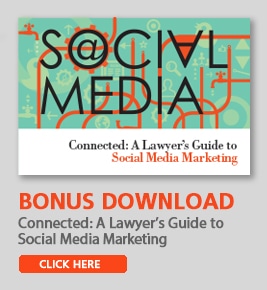Lawyers are routinely told how necessary it is to maintain an active presence on Twitter. With good reason: With 284 million monthly active users (48.2 million of whom reside within the U.S.), it’s a safe bet your potential clients are there.
More importantly, consumers are increasingly turning to social media channels when evaluating purchasing decisions — even legal services. Plus, clients control more of the purchasing journey than ever before — often, by the time they reach out and contact you, they’ve already decided to retain your services. Therefore, it’s become imperative that you remain top-of-mind by communicating, engaging, building trust and establishing relationships with the people who could someday become your clients.
But on a platform where more than 500 million messages are sent every day and the average lifespan of a tweet hovers around 18 minutes before it disappears into a void of cat pictures and TV show spoilers forever, how do you make sure you’re getting return on your social media investment?
Tip 1: Know Your Goals
Before investing time in any social network, it’s imperative that you have a clear idea of exactly what you’re trying to accomplish (beyond the obvious “attract more clients”). Are you trying to build more awareness of your firm locally? Drive traffic to your website? Engage with industry thought leaders? All of the above? Set up a social media dashboard like Hootsuite or TweetDeck. Think of search terms or hashtags your target audiences are using, and save them as streams for easy access and quick reference later on.
Tip 2: Get Visual
They say a picture is worth a thousand words — but on Twitter, a picture can be worth far more (if you can shoehorn them in there). With a 140 character limit, there’s only so much text you can include — but an image can give you an opportunity to circumvent those limitations by communicating ideas visually, or by overlaying text on the image. As a bonus, tweets with images traditionally see much higher engagement than those without, gaining up to 150 percent more link clicks, retweets and favorites.
Tip 3: Call Me, Maybe?
A “Call to Action,” in marketing speak, is a strong phrase that compels your audience to take a desired action (for example, “visit my website” or “click here for more information”). Using strong calls to action can amplify your message to the Twittersphere at large (example: “Please RT”), increase engagement (example: “Reply with your thoughts!”), or boost website traffic (“Read my latest blog post!”). Because Twitter is, above all, an engagement platform, it’s recommended that you use overtly “salesy” calls to action (“Buy my lawyering!”) infrequently — instead, focus on actions that drive discussion and communication.
Tip 4: Hashtags
Hashtags, the #now #ubiquitous #method of labelling tweets as belonging to a particular conversation or topic, are a great way of gaining exposure to an entire new audience or targeting your messaging in real-time to an audience discussing a trending topic (a recent example involved defense lawyers who were tweeting their phone numbers using the #ShutItDown hashtag related to Eric Garner protests, offering their services to protesters arrested). Hashtags also offer a great opportunity to take part in Twitter conversations or chats around a variety of topics (check out #ClioWeb for Clio webinar discussions, or #LegalTech, a lively discussion on emerging legal technology solutions). When crafting tweets, #less is #more when it comes to hashtag use — while tweets including one or two hashtags can provide up to two times the engagement as tweets without, throwing in a third (or more) hashtag can actually reduce engagement. Stick to one hashtag per tweet to be safe.
Tip 5: Be Yourself, Everyone Else Is Already Taken
The ultimate goal of social media is the “social” part — building legitimate, lasting relationships with people who could benefit you enormously either personally or professionally. The best way to do so is by being sincere, honest, and showing your true personality. Public perception is that lawyers are a stodgy, humorless bunch — we know this isn’t the case. Don’t be afraid to let your true self shine through.
Tip 6: Be Ethical
Familiarize yourself with your state bar’s social media ethics opinion or guidelines before tweeting — it’s easier than you would think to run afoul of the professional rules of advertising governing lawyers, particularly when discussing previous cases, courtroom wins, or actively soliciting business via social media channels. Some examples:
Bad Messaging
“Case finally over. Unanimous verdict! Celebrating tonight.”
“Won a million dollar verdict. Tell your friends and check out my website.”
“Won another personal injury case. Call me for a free consultation.”
“Another great victory in court today! My client is delighted.
Who wants to be next?”
Good Messaging
“Just published an article on wage and hour breaks. Let me know if you’d like a copy.”
Tip 7: Test, Analyze, Optimize
Twitter quietly rolled out its native Analytics platform to all users last year (previously, it was only available to paid advertisers). Twitter Analytics gives you a wealth of actionable data and shows you exactly what’s working on every tweet you send, including how many retweets, replies, and favorites you get, as well as number of impressions (the exact number of times your tweet appears in user timelines), link clicks (if you’re directing to a blog post or your website), and more.
Experiment with your tweets — tweet the same thing at different times of day, change up your copies, calls to action, images and more — to figure out exactly what resonates with your followers and has the biggest impact for your social media following and business development.

Derek Bolen is the Social Media and Community Manager at Clio (@GoClio). You can find him contributing to a number of online blogs, chatting about social media and marketing, or tweeting baby pictures at @hurrrdurrr.
Sponsored Links
»New! Finance Conference for the Legal C-Suite, May 17, Nashville. Sign up Now!
»Learn more about the way attorneys get paid. Free trial.
»Register now for Lawyernomics 2015, May 13-15, Wynn Las Vegas.
»Dominate your depositions. Free e-book.
Illustration ©iStockPhoto.com
















